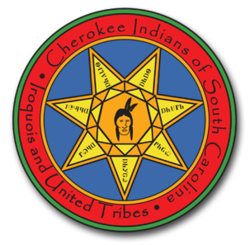Eastern Cherokee, Southern Iroquois, and United Tribes of South Carolina
 Official logo of the Eastern Cherokee, Southern Iroquois and United Tribes of South Carolina, Inc. (ECSIUT) | |
| Abbreviation | ECSIUT |
|---|---|
| Formation | June 27, 1997[1] |
| Founder | William M. Goins[1] |
| Founded at | Columbia, SC[1] |
| Type | 501(c)(3) organization, Cherokee heritage group |
| EIN 58-2328510[2] | |
| Purpose | A23: Cultural, Ethnic Awareness[2] |
| Headquarters | Duncan, SC[3] |
| Membership | 400 |
Official language | English |
Chief | Lamar Nelson[3] |
Vice-Chief | Jody Noe[3] |
| Website | cherokeeofsc.com |
The Eastern Cherokee, Southern Iroquois and United Tribes of South Carolina, Inc. or ECSIUT is a 501(c)(3) nonprofit organization[1][2] and "state-recognized group" not to be confused with a state-recognized tribe.[3] The state of South Carolina gave them the state-recognized group and special interest organization designation under the SC Code Section 1-31-40 (A) (7)(10), Statutory Authority Chapter 139 (100-111) on February 17, 2005.[4]
The Eastern Band of Cherokee Indians, Cherokee Nation, and United Keetoowah Band of Cherokee Indians are collectively opposed to the ECSIUT, with the Cherokee Nation notably including the organization in a list of 212 "fraudulent groups" that claim Cherokee identity.[5] These three federally recognized tribes uniformly uphold a strict stance against federally unrecognized Cherokee heritage groups asserting Cherokee tribal identity.[5][6]
Headquarters and purpose
[edit]The ECSIUT was first headquartered in Columbia, South Carolina and led by William Moreau Goins, who founded the group and served as CEO until his passing in late 2017.[7] In April of 2020, the ECSIUT elected archaeologist Lamar Nelson as their new chief and CEO.[8] Nelson previously served on the organization's board and alleges to be of Choctaw and Cherokee descent.[9] The ECSIUT is presently headquartered in Duncan, South Carolina.[3]
The ECSIUT was established with the mission to "preserve, present, protect, and document Cherokee history and other Native American Indian tribes' cultures and individuals, material culture, historic buildings, and folkways in South Carolina".[10]
Membership
[edit]The ECSIUT as a state-recognized "group" under South Carolina law, is composed of individuals with diverse characteristics, interests, and behaviors that do not reflect a unified ethnic and cultural heritage.[11] The organization includes Native Americans and people from other ethnic groups, without need for blood relation amongst members.[11] This membership designation differs from that of a state-recognized tribe, where members are part of an assembly of various interrelated families, clans, or generations, and their descendants.[11]
Activities
[edit]For 20 years the ESCIUT hosted an annual Native American film festival in Columbia, South Carolina which gave exposure to Indigenous filmmakers.[12]
The ESCIUT hosts an annual powwow at Hagood Mill Historic Site in Pickens County, South Carolina.[13]
References
[edit]- ^ a b c d "ASTERN CHEROKEE, SOUTHERN IROQUOIS & UNITED TRIBES OF SOUTH CAROLINA, A HERITAGE SOCIETY: THE CHEROKEE INDIAN TRIBE OF SOUTH CAROLINA, INC". OpenCorporates. Retrieved 18 January 2022.
- ^ a b c "Eastern Cherokee Southern Iroquois and United Tribes of South Carolin [sic]". Cause IQ. Retrieved 18 January 2022.
- ^ a b c d e "State Recognized Groups and Special Interest Organizations". South Carolina Commission for Minority Affairs. Retrieved 17 January 2022.
- ^ "South Carolina's Recognized Native American Indian Entities | Commission for Minority Affairs". cma.sc.gov. Retrieved 21 October 2019.
- ^ a b Brown, Anthony (14 October 2011). "Tribe establishes Cherokee Identity Protection Committee". The Cherokee One Feather. Retrieved 1 January 2024.
- ^ Crawford, Grant D. (4 October 2019). "'Fake tribes' can threaten federally recognized ones, genealogist says". Tahlequah Daily Press. Retrieved 1 January 2024.
- ^ "Obituary of Dr. William Moreau Goins". legacy.com. Retrieved 21 October 2019.
- ^ "New tribal leader". www.pagelandprogressive.com. Retrieved 18 April 2020.
- ^ "Learn about Native American history at Landrum Library speaking event". The Tryon Daily Bulletin. 9 January 2023. Retrieved 1 January 2024.
- ^ Crediford, Gene J. (2009). Those Who Remain: A Photographer's Memior of South Carolina Indians (1st ed.). Tuscaloosa, AL: University of Alabama Press. p. 43. ISBN 9780817355180.
- ^ a b c "Chapter 139: Commission for Minority Affairs" (PDF). scstatehouse.gov. Retrieved 1 January 2024.
- ^ "20th Annual Native American Indigenous Film Festival of Southeast". onecolumbiasc. Retrieved 21 October 2019.
- ^ Stoddard, Freeman (23 April 2022). "American Indian Tribes host Pow Wow event in the Upstate". Fox Carolina. Retrieved 7 March 2023.
